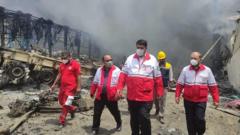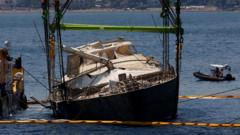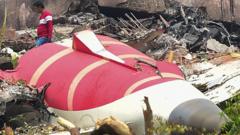A massive blast at Shahid Rajaee port has resulted in at least 40 deaths and over 1,000 injuries, with public anger directed towards authorities. Investigations suggest improper handling of explosive materials may be to blame, while concerns grow over potential impacts on the Iranian economy and international relations.
Rising Tensions in Iran Following Devastating Port Explosion

Rising Tensions in Iran Following Devastating Port Explosion
A catastrophic explosion at Iran's largest commercial port has ignited both grief and outrage among citizens, raising questions about governmental accountability and safety.
In a shocking turn of events that has spurred sorrow and ire in Iran, a massive explosion at the Shahid Rajaee port, the nation's largest commercial port, has claimed at least 40 lives and injured over 1,000 individuals. The devastating blast occurred on Saturday morning, prompting a rush to hospitals as citizens came forward to donate blood.
As the hours passed, thick black smoke continued to billow from the port, raising concerns over toxic chemicals in the air. The health ministry has advised residents in surrounding towns and cities to remain indoors for their safety, with protective clothing recommended. In Bandar Abbas, a pivotal city housing the Iranian Navy’s main base, local schools and offices were ordered to close on Sunday to facilitate emergency response efforts.
A nearby local festival, initially slated as a celebration, transformed into a somber remembrance for the deceased and prayers for the injured. In response, the government declared a national day of mourning on Monday, alongside an extended two-day period in Hormozgan province, highlighting the gravity of the situation.
As mourning shifts to anger within the populace, scrutiny is directed towards authorities amidst rising speculation about the cause of the explosion. Reports from Ambrey Intelligence, a private maritime risk consultancy, suggest that the intense fires preceding the explosion were due to "improper handling of a shipment of solid fuel intended for Iranian ballistic missiles." These claims have been echoed by sources within Iran’s Islamic Revolutionary Guard Corps, indicating the explosion involved sodium perchlorate, a key ingredient for missile fuel.
Nonetheless, skepticism looms over whether the public can trust assertions from officials, especially as accusations of negligence about storing dangerous materials at the port surface. Many citizens are left questioning: How could such volatile materials have been negligently managed?
Amid these intense discussions, President Masoud Pezeshkian inspected the explosion site on Sunday, aiming to gauge the situation directly and promising a full investigation into the incident. Statements from the defense ministry assert that the area has not seen any military imports or exports emanating from the explosion, while customs officials attribute the incident to a fire in the chemical materials storage depot.
The implications of the explosion on Iran’s economy remain a significant concern, particularly given that the port accounts for nearly 80% of the nation's imports. Initial warnings from authorities suggested possible food shortages due to the explosion, although later assurances indicated that only part of the port was affected and operations continue to function elsewhere.
Images from the disaster showcase helicopters attempting to contain the blaze, firefighters amid charred containers, and the grim process of recovery for victims. In an expression of international solidarity, various countries, including Russia and the UAE, have extended condolences and offered assistance to Iran in the wake of this tragedy.
As concerns for public safety and economic stability mount, the blast’s timing coinciding with ongoing negotiations regarding Iran's nuclear program will add a complex layer to the unfolding narrative. While the Iranian government expresses a willingness to negotiate curbs on its nuclear ambitions in exchange for sanction relief, it steadfastly maintains its right to enrich uranium for civilian purposes.




















